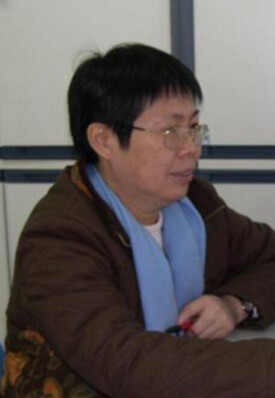共找到19條詞條名為周慧的結果 展開
周慧
吉林大學生命科學學院博士研究生導師
周慧,女,漢族,1954年2月出生,湖南人,博士研究生導師,吉林大學匡亞明特聘教授。1977年畢業於吉林大學化學系,1981年吉林大學化學系碩士研究生畢業后留校任教,1989年獲得博士學位。隨後多次到英國、美國和澳大利亞等地著名大學進修和訪問。1992年破格提升為教授,同年獲得國務院津貼。
1978——1981 吉林大學化學系 碩士研究生
1986——1989 吉林大學化學系 博士研究生
1990——1992 吉林大學分子生物學系 副教授
1992——1999 吉林大學生命科學學院 教授
1999.9——至今 博士研究生導師,主要研究領域為考古DNA和多種蛋白的研究。
| 國家教委科技進步獎三等獎 第三名 | 1990年 |
| 第二屆東北地區發明展覽會二等獎 第一名 | 1992年 |
| 國務院政府津貼 | 1993年 |
| 國家教委跨世紀優秀人才 | 1995年 |
| 國家教委跨世紀優秀人才 | 1995年 |
| 吉林省“巾幗崗位明星” | 1998年 |
| 吉林省有突出貢獻青年專家 | 1997年 |
| 教育部優秀骨幹教師 | 2002年 |
1)蛋白質結構與功能,國家教委跨世紀優秀人才基金1996-1999,30萬元,負責人
2)FGF拮抗劑的設計,國家九五攻關課題,1997-1999,30萬元。負責人
3)通過肽庫進行藥物篩選和設計的研究 39670853國家自然科學基金1997-1999,9萬元負責人
4)自然科學方法在考古學中的應用,國家基金委人才基地1998-2001,200萬元,第二負責人
5)克里雅隔離人群DNA多態性研究,國家教育部科技司重大項目2000-2001,60 萬元負責人
6)新疆古代居民DNA多態性研究,國家文物局,1999-2002,30萬元,第二負責人
7)新型器官移植免疫抑製劑的研究,國家九五攻關課題1999-2000。10萬元負責人
9)CYP2C9新突變體的結構與功能研究,國家自然科學基金30472062,2005-2007,21萬元,負責人
10)自然科學方法在考古學中的應用,國家基金委人才基地J0030094,2001-2005,100萬元負責人
11)特殊學科點項目 J0530184國家基礎科學人才培養基金2007-2009,110萬元,負責人
12)國家文物局:中國古代人類DNA遺傳資源獲取技術規範制定,2009-2011年
13)國家自然科學基金委J0930002,2009-2011 國家基礎科學人才培養基金
14)國家科技部“十一五”支撐計劃--子課題,3500BC-1500BC中國文明形成與早期發展階段的技術與經濟研究 2007-2008
15)國家自然科學基金,阿糖胞苷聯合丙戊酸誘導白血病細胞(AMK)凋亡研究 2009.01-2009.12.
以通訊作者在國際知名刊物發表的論文主要有:
Selection of Peptide Ligands Binding to Fibroblast Growth Factor Receptor1, IUBMB Life,2002,54:67-72.
Identification of an noval allel 2C9 in Chinese ,Pharmacogenetics 2004,14,465-469
ROLE OF CYP2C9 AND ITS VARIANTS (CYP2C9*3 AND CYP2C9*13) IN THE METABOLISM OF LORNOXICAM IN HUMANS, DRUG METABOLISM AND DISPOSITION, DMD 33:1–5, 2005
Catalytic Activities of Human Cytochrome P450 2C9*1、2C9*3 and 2C9*13, Xenobiotic, September 2005;35(9);853-861
Genetic analysis on Tuoba Xianbei remains excavated from Qilang mountain cemetery in Qahar Right Wing Middle Banner of Inner Mongolia FEBS Letters 580(2006) 6242-6246
On the human CYP2C9*13 variant activity reduction:a molecular dynamics simulation and docking study, Biochimie 88 (2006) 1457–1465
Molecular genetic analysis of remains from Lamadong cemetery, Liaoning, China. Am J Phys Anthropol. 2007 Nov;134(3):404-11.
Tracing the genetic history of the Chinese people: mitochondrial DNA analysis of aneolithic population from the Lajia site.Am J Phys Anthropol. 2007 Aug;133(4):1128-36.
Molecular genetic analysis of Wanggu remains, Inner Mongolia, China. Am J Phys Anthropol. 2007 Feb;132(2):285-91.
Mechanism of CYP2C9 Inhibition by Flavones and Flavonols, Drug Metabolism and Disposition 2009 37: 629-634.
Ancient DNA analysis of human remains from the upper capital city of Kublai Khan. Am J Phys Anthropol. 2009 Jan;138(1):23-9.
Role of Residue 90 in Catalysis of Cytochrome P450 2C9,CHEM. RES. CHINESE UNIVERSITIES 2009, 25(6), 904—908
Evidence that a West-East admixed population lived in the Tarim Basin as early as the early Bronze Age. BMC Biol. 2010 Feb 17;8:15.
Early Eurasian migration traces in the Tarim Basin revealed by mtDNA polymorphisms. Am J Phys Anthropol. 2010 Aug;142(4):558-64.
Mitochondrial DNA analysis provides new insights into the origin of the Chinese domestic goat,Small Ruminant ResearchVolume 90, Issue 1 , Pages 41-46, May 2010
Ancient DNA from nomads in 2500-year-old archeological sites of Pengyang, China.J Hum Genet. 2010 Apr;55(4):215-8.
Ancient DNA evidence supports the contribution of Di-Qiang people to the han Chinese gene pool. Am J Phys Anthropol. 2011 Feb;144(2):258-68.
Ancient DNA analysis of desiccated wheat grains excavated from a Bronze Age cemetery in Xinjiang,Journal of Archaeological Science. Volume 38, Issue 1, January 2011, Pages 115–119
Genetic characteristics and migration history of a bronze culture population in the West Liao-River valley revealed by ancient DNA.J Hum Genet. 2011 Dec;56(12):815-22. doi: 10.1038/jhg.2011.102.
Distribution of CYP2C9*13 allele in the Chinese Han and the long-range haplotype containing CYP2C9*13 and CYP2C19*2. Biopharm Drug Dispos. 2012 Aug 8. doi: 10.1002/bdd.1804. [Epub ahead of print]
